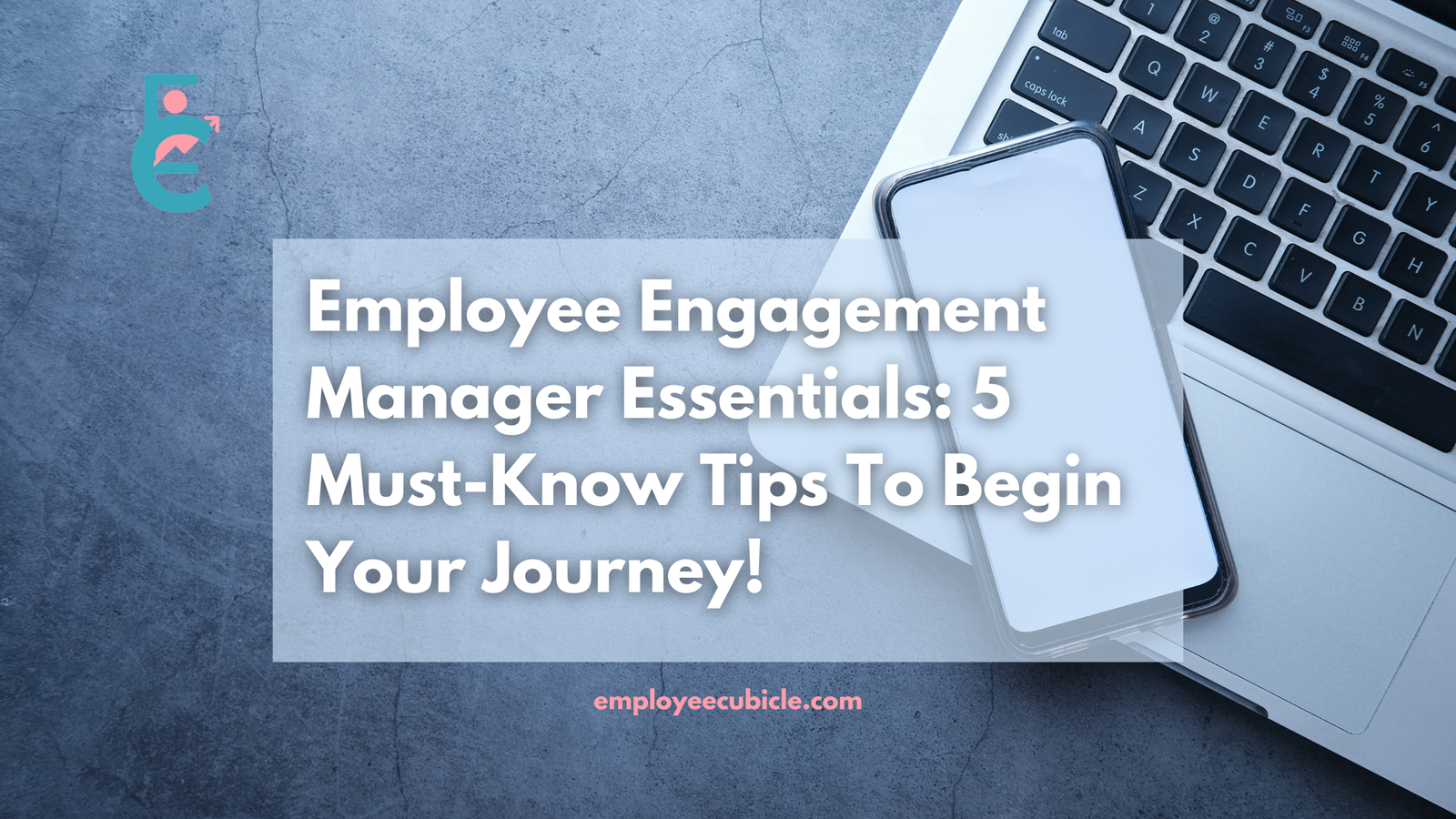The role of an Employee Engagement Manager (EEM) has never been more essential in today’s dynamic work environment. In an age where a company’s most significant asset is its employees, ensuring they are engaged, motivated, and satisfied is of paramount importance.
Let’s dive into the world of the EEM and discover the pivotal role they play, along with some must-know tips for anyone venturing into this field.
Who is an Employee Engagement Manager?
An Employee Engagement Manager is a professional tasked with devising and executing strategies to boost the relationship between a company and its workforce. They aim to ensure employees feel valued and aligned with the company’s goals, leading to a more productive and harmonious workplace.
An Employee Engagement Manager is like the backbone of an organization, ensuring its smooth functioning by guaranteeing the happiness and efficiency of its workforce. They wear many hats, from understanding employee needs to strategizing ways to boost morale.
What is an Employee Engagement Manager Job Description?
The job description for an Employee Engagement Manager can vary depending on the organization’s specific needs and goals. However, here’s a general outline of the key responsibilities and qualifications typically associated with this role:
Primary Responsibilities:
- Strategize and Implement Engagement Initiatives: Design and roll out programs aimed at enhancing employee morale, satisfaction, and productivity.
- Gather and Analyze Feedback: Use surveys, focus groups, and one-on-one interviews to gather employee feedback. Interpret this data to improve engagement strategies.
- Collaborate with HR and Management: Work closely with HR and other departments to ensure alignment of engagement initiatives with broader company objectives.
- Plan and Organize Events: Coordinate team-building events, workshops, and other activities that promote a positive work culture.
- Monitor Engagement Metrics: Track and report on key indicators of employee engagement and recommend areas for improvement.
- Provide Training: Educate team leaders and managers on best practices for fostering a positive work environment and maintaining high employee morale.
Qualifications and Skills Required:
- Educational Background: Typically, a bachelor’s degree in Human Resources, Business, or a related field. Some positions may require a master’s degree or relevant certifications.
- Experience: Previous experience in HR, employee engagement, or a related role is often preferred.
- Communication Skills: Strong verbal and written communication abilities to interact effectively with employees at all levels.
- Analytical Skills: Ability to analyze data, spot trends, and develop actionable insights.
- Interpersonal Skills: Must be approachable, empathetic, and adept at building trustful relationships.
- Organizational Skills: Capable of managing multiple projects and initiatives simultaneously.
The impact of an efficient Employee Engagement Manager is easily visible in the contented faces of the workforce and the positive workplace atmosphere they help cultivate.

what are The 5 Must-Know Tips to Start Journey as an Employee Engagement Manager?
Starting a journey as an Employee Engagement Manager is both exciting and challenging. Here are five must-know tips to ensure a successful beginning:
- Understand the Company Culture
- Historical Context: As an aspiring Employee Engagement Manager, understanding the origins and evolutionary journey of the company is vital. This backdrop provides invaluable context for where the organization is headed.
- Interactions at All Levels: Spend time not just with management but also with frontline staff. Engaging in genuine conversations across hierarchies will give a multidimensional view of the prevailing culture.
- Company Rituals and Traditions: Be a part of company events, gatherings, and other traditions. They often provide unspoken insights into what the company values and can inform the strategies of an Employee Engagement Manager.
- Invest in Continuous Learning
- Professional Development: Seek out workshops and courses that enhance both your technical knowledge and soft skills. The role of an Employee Engagement Manager is ever-evolving, so staying updated is crucial.
- Engagement Trends: The world of work and engagement is rapidly changing. Keep abreast of global trends and research in employee well-being and motivation.
- Mentorship: Consider both being a mentor and having a mentor. This two-way learning can be pivotal for an Employee Engagement Manager, enriching your perspective and expertise.
- Prioritize Open Communication
- Accessible and Approachable: Cultivate an image where employees, irrespective of their position, feel they can approach their Employee Engagement Manager without hesitation.
- Feedback Loops: Beyond just collecting feedback, ensure there’s a transparent loop where employees see the results of their feedback and consequent actions taken.
- Leverage Data and Analytics
- Holistic Data Collection: Use a mix of qualitative (focus groups, interviews) and quantitative (surveys, analytics tools) methods for a comprehensive understanding. Being data-informed is a hallmark of an effective Employee Engagement Manager.
- Predictive Analysis: Instead of just addressing current concerns, use data to predict potential future challenges and proactively address them.
- Visualization Tools: Use dashboards and other visualization tools. They can make complex data more comprehensible and actionable for stakeholders, aiding the Employee Engagement Manager in making data-driven decisions.
- Collaborate Across Departments
- Cross-functional Projects: Initiate or be a part of projects that involve multiple departments. This fosters a sense of collective goal achievement and breaks departmental silos. For an Employee Engagement Manager, this collaboration can lead to richer engagement strategies.
- Champion the Cause: Advocate the importance of employee engagement at every platform, ensuring it becomes a priority across departments and not just an isolated initiative.
- Feedback to Strategy: Ensure that the feedback and insights you gather are translated into strategic inputs that different departments can act upon, amplifying the impact of the Employee Engagement Manager’s role.
The journey of an Employee Engagement Manager is about creating bridges, fostering open communication, and ensuring that every individual feels connected to the larger organizational tapestry.
What are the Future paths for an Employee Engagement Manager role?
The role of an Employee Engagement Manager is set to undergo significant transformation due to evolving workplace dynamics. Let’s explore the potential future trajectories of this crucial position:
- Adaptation to Remote Work and Digital Transformation:
- As businesses increasingly embrace hybrid or entirely remote models, the Employee Engagement Manager will be at the forefront of ensuring virtual environments maintain high engagement. This means understanding unique remote work challenges and harnessing digital tools to foster connection and camaraderie.
- Increased Focus on Employee Well-being:
- The realm of employee health is broadening. Mental health and holistic well-being will centralize within engagement strategies. Future Employee Engagement Managers will likely collaborate more closely with health professionals and wellness experts, creating comprehensive well-being programs that resonate with modern workforce needs.
- Data-Driven Decision Making:
- AI and advanced analytics are changing the game. An Employee Engagement Manager of the future will harness data to comprehend employee sentiments, proactively address engagement concerns, and tailor interventions with precision.
- Diversity, Equity, and Inclusion (DEI):
- Engagement and DEI will intertwine further. As businesses globally prioritize inclusivity, the Employee Engagement Manager’s role will evolve to ensure engagement strategies are diverse and inclusive, catering to every segment of the workforce.
- Upskilling and Continuous Learning:
- With rapid global shifts, lifelong learning gains prominence. Employee Engagement Managers will be pivotal in fostering environments where skill development thrives, ensuring employees are perpetually engaged and aligned with evolving industry demands.
- Enhanced Use of Technology:
- Technologies like virtual reality (VR), augmented reality (AR), and gamification will be indispensable tools in an Employee Engagement Manager’s toolkit. They’ll offer innovative ways to motivate, train, and connect employees across geographies.
- Greater Collaboration with Cross-Functional Teams:
- Engagement strategies will necessitate broader collaborations. Employee Engagement Managers will liaise more frequently with IT, HR, and executive teams, ensuring a holistic approach to employee motivation and satisfaction.
- Environmental and Social Responsibility:
- As corporate responsibility gains traction, Employee Engagement Managers will intertwine sustainability and corporate social responsibility into their engagement paradigms. This alignment will cater to the values and expectations of the modern workforce.
- Personalized Engagement:
- Advanced analytics and AI will usher in an era of personalized engagement. Employee Engagement Managers will craft interventions based on individual employee needs, moving away from generic strategies.
- Crisis Management and Resilience Building:
- In a world of uncertainties, from pandemics to economic challenges, the Employee Engagement Manager will be essential in bolstering employee resilience, ensuring teams remain motivated and unified during challenging times.
In sum, the role of the Employee Engagement Manager will be multifaceted, dynamic, and integral to organizational success. As businesses adapt to the changing global landscape, this role will be indispensable in navigating the complexities of employee motivation and engagement.
Conclusion
The journey of an Employee Engagement Manager is intricate, rewarding, and ever-evolving. From immersing oneself in the company culture to leveraging advanced technological tools for data-driven decisions, this role demands both empathy and strategic foresight. As businesses worldwide recognize the profound influence of a fully engaged workforce, it’s evident that the strategies and insights provided in this guide are invaluable.
Embracing diversity, fostering open communication, prioritizing well-being, and understanding the vast landscape of remote work are not just tasks but essential components in the toolkit of a successful Employee Engagement Manager. As you embark on this fulfilling journey, remember that continuous learning, adaptation, and a genuine passion for people will always be your guiding stars.
Loved the insights? Share your thoughts in the comments below! If you found this guide helpful, don’t forget to share it with your network. Let’s spark a conversation and elevate the discourse on employee engagement. Engage, share, and inspire!



